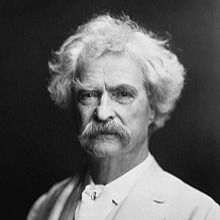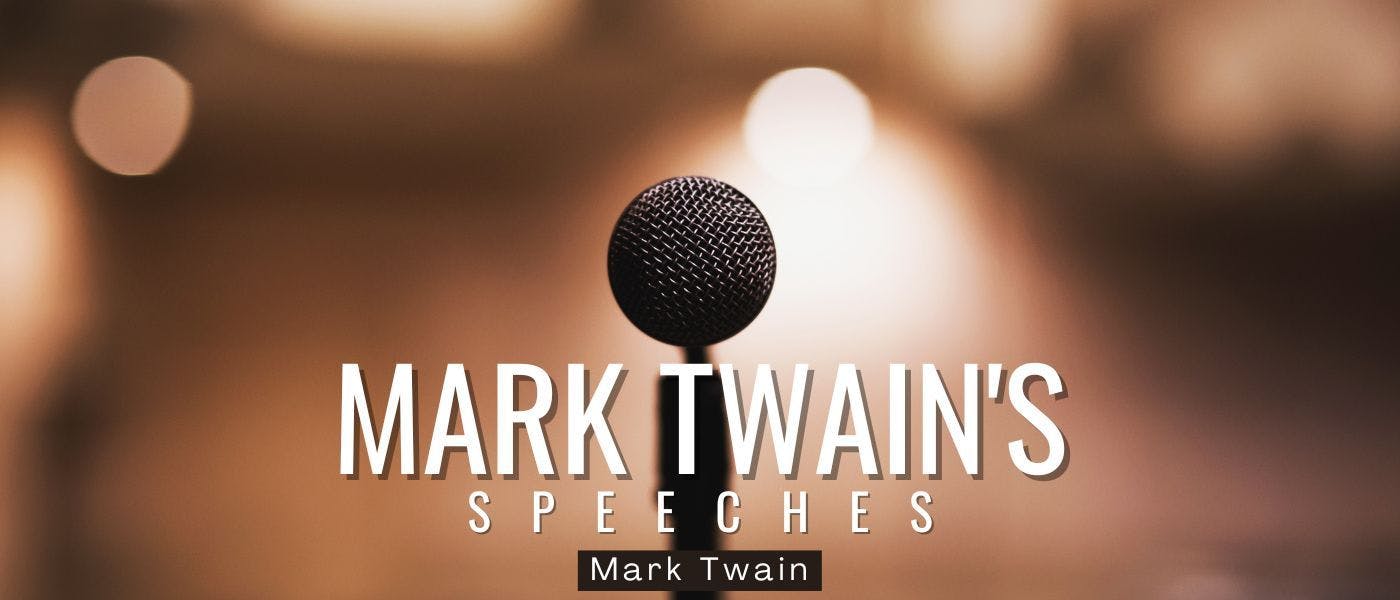Mark Twain's Speeches by Mark Twain, is part of the HackerNoon Books Series. You can jump to any chapter in this book here. JOAN OF ARC
JOAN OF ARC
ADDRESS AT THE DINNER OF THE SOCIETY OF ILLUSTRATORS, GIVEN AT
THE ALDINE ASSOCIATION CLUB, DECEMBER 22, 1905
Just before Mr. Clemens made his speech, a young woman attired
as Joan of Arc, with a page bearing her flag of battle,
courtesied reverently and tendered Mr. Clemens a laurel wreath
on a satin pillow. He tried to speak, but his voice failed
from excess of emotion. “I thank you!” he finally exclaimed,
and, pulling himself together, he began his speech.
Now there is an illustration [pointing to the retreating Joan of Arc]. That is exactly what I wanted—precisely what I wanted—when I was describing to myself Joan of Arc, after studying her history and her character for twelve years diligently.
That was the product—not the conventional Joan of Arc. Wherever you find the conventional Joan of Arc in history she is an offence to anybody who knows the story of that wonderful girl.
Why, she was—she was almost supreme in several details. She had a marvellous intellect; she had a great heart, had a noble spirit, was absolutely pure in her character, her feeling, her language, her words, her everything—she was only eighteen years old.
Now put that heart into such a breast—eighteen years old—and give it that masterly intellect which showed in the face, and furnish it with that almost god-like spirit, and what are you going to have? The conventional Joan of Arc? Not by any means. That is impossible. I cannot comprehend any such thing as that.
You must have a creature like that young and fair and beautiful girl we just saw. And her spirit must look out of the eyes. The figure should be—the figure should be in harmony with all that, but, oh, what we get in the conventional picture, and it is always the conventional picture!
I hope you will allow me to say that your guild, when you take the conventional, you have got it at second-hand. Certainly, if you had studied and studied, then you might have something else as a result, but when you have the common convention you stick to that.
You cannot prevail upon the artist to do it; he always gives you a Joan of Arc—that lovely creature that started a great career at thirteen, but whose greatness arrived when she was eighteen; and merely because she was a girl he can not see the divinity in her, and so he paints a peasant, a coarse and lubberly figure—the figure of a cotton-bale, and he clothes that in the coarsest raiment of the peasant region just like a fish woman, her hair cropped short like a Russian peasant, and that face of hers, which should be beautiful and which should radiate all the glories which are in the spirit and in her heart that expression in that face is always just the fixed expression of a ham.
But now Mr. Beard has intimated a moment ago, and so has Sir Purdon-Clarke also, that the artist, the illustrator, does not often get the idea of the man whose book he is illustrating. Here is a very remarkable instance of the other thing in Mr. Beard, who illustrated a book of mine. You may never have heard of it. I will tell you about it now—A Yankee in King Arthur’s Court.
Now, Beard got everything that I put into that book and a little more besides. Those pictures of Beard’s in that book—oh, from the first page to the last is one vast sardonic laugh at the trivialities, the servilities of our poor human race, and also at the professions and the insolence of priest-craft and king-craft—those creatures that make slaves of themselves and have not the manliness to shake it off. Beard put it all in that book. I meant it to be there. I put a lot of it there and Beard put the rest.
That publisher of mine in Hartford had an eye for the pennies, and he saved them. He did not waste any on the illustrations. He had a very good artist—Williams—who had never taken a lesson in drawing. Everything he did was original. The publisher hired the cheapest wood-engraver he could find, and in my early books you can see a trace of that. You can see that if Williams had had a chance he would have made some very good pictures. He had a good heart and good intentions.
I had a character in the first book he illustrated—The Innocents Abroad. That was a boy seventeen or eighteen years old—Jack Van Nostrand—a New York boy, who, to my mind, was a very remarkable creature. He and I tried to get Williams to understand that boy, and make a picture of Jack that would be worthy of Jack.
Jack was a most singular combination. He was born and reared in New York here. He was as delicate in his feelings, as clean and pure and refined in his feelings as any lovely girl that ever was, but whenever he expressed a feeling he did it in Bowery slang, and it was a most curious combination—that delicacy of his and that apparent coarseness. There was no coarseness inside of Jack at all, and Jack, in the course of seventeen or eighteen years, had acquired a capital of ignorance that was marvellous—ignorance of various things, not of all things. For instance, he did not know anything about the Bible. He had never been in Sunday-school. Jack got more out of the Holy Land than anybody else, because the others knew what they were expecting, but it was a land of surprises to him.
I said in the book that we found him watching a turtle on a log, stoning that turtle, and he was stoning that turtle because he had read that “The song of the turtle was heard in the land,” and this turtle wouldn’t sing. It sounded absurd, but it was charged on Jack as a fact, and as he went along through that country he had a proper foil in an old rebel colonel, who was superintendent and head engineer in a large Sunday-school in Wheeling, West Virginia. That man was full of enthusiasm wherever he went, and would stand and deliver himself of speeches, and Jack would listen to those speeches of the colonel and wonder.
Jack had made a trip as a child almost across this continent in the first overland stage-coach. That man’s name who ran that line of stages—well, I declare that name is gone. Well, names will go.
Halliday—ah, that’s the name—Ben Halliday, your uncle [turning to Mr. Carnegie]. That was the fellow—Ben Halliday—and Jack was full of admiration at the prodigious speed that that line of stages made—and it was good speed—one hundred and twenty-five miles a day, going day and night, and it was the event of Jack’s life, and there at the Fords of the Jordan the colonel was inspired to a speech (he was always making a speech), so he called us up to him. He called up five sinners and three saints. It has been only lately that Mr. Carnegie beatified me. And he said: “Here are the Fords of the Jordan—a monumental place. At this very point, when Moses brought the children of Israel through—he brought the children of Israel from Egypt through the desert you see there—he guarded them through that desert patiently, patiently during forty years, and brought them to this spot safe and sound. There you see—there is the scene of what Moses did.”
And Jack said: “Moses who?”
“Oh,” he says, “Jack, you ought not to ask that! Moses, the great law-giver! Moses, the great patriot! Moses, the great warrior! Moses, the great guide, who, as I tell you, brought these people through these three hundred miles of sand in forty years, and landed them safe and sound.”
Jack said: “There’s nothin’ in that three hundred miles in forty years. Ben Halliday would have snaked ’em through in thirty—six hours.”
Well, I was speaking of Jack’s innocence, and it was beautiful. Jack was not ignorant on all subjects. That boy was a deep student in the history of Anglo-Saxon liberty, and he was a patriot all the way through to the marrow. There was a subject that interested him all the time. Other subjects were of no concern to Jack, but that quaint, inscrutable innocence of his I could not get Williams to put into the picture.
Yes, Williams wanted to do it. He said: “I will make him as innocent as a virgin.” He thought a moment, and then said, “I will make him as innocent as an unborn virgin;” which covered the ground.
I was reminded of Jack because I came across a letter to-day which is over thirty years old that Jack wrote. Jack was doomed to consumption. He was very long and slim, poor creature; and in a year or two after he got back from that excursion, to the Holy Land he went on a ride on horseback through Colorado, and he did not last but a year or two.
He wrote this letter, not to me, but to a friend of mine; and he said: “I have ridden horseback”—this was three years after—“I have ridden horseback four hundred miles through a desert country where you never see anything but cattle now and then, and now and then a cattle station—ten miles apart, twenty miles apart. Now you tell Clemens that in all that stretch of four hundred miles I have seen only two books—the Bible and ‘Innocents Abroad’. Tell Clemens the Bible was in a very good condition.”
I say that he had studied, and he had, the real Saxon liberty, the acquirement of our liberty, and Jack used to repeat some verses—I don’t know where they came from, but I thought of them to-day when I saw that letter—that that boy could have been talking of himself in those quoted lines from that unknown poet:
“For he had sat at Sidney’s feet
And walked with him in plain apart,
And through the centuries heard the beat
Of Freedom’s march through Cromwell’s heart.”
And he was that kind of a boy. He should have lived, and yet he should not have lived, because he died at that early age—he couldn’t have been more than twenty—he had seen all there was to see in the world that was worth the trouble of living in it; he had seen all of this world that is valuable; he had seen all of this world that was illusion, and illusion, is the only valuable thing in it. He had arrived at that point where presently the illusions would cease and he would have entered upon the realities of life, and God help the man that has arrived at that point.
About HackerNoon Book Series: We bring you the most important technical, scientific, and insightful public domain books.
This book is part of the public domain. Mark Twain (2004). Mark Twain's Speeches. Urbana, Illinois: Project Gutenberg. Retrieved October 2022 https://www.gutenberg.org/cache/epub/3188/pg3188-images.html
This eBook is for the use of anyone anywhere at no cost and with almost no restrictions whatsoever. You may copy it, give it away or re-use it under the terms of the Project Gutenberg License included with this eBook or online at www.gutenberg.org, located at https://www.gutenberg.org/policy/license.html.

